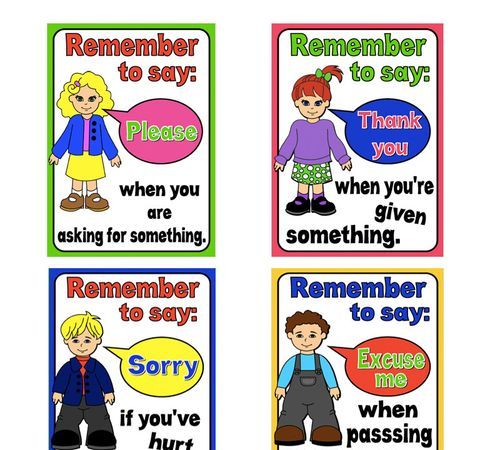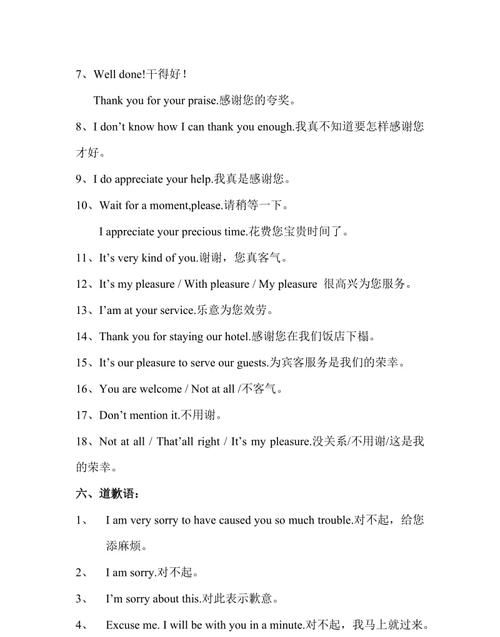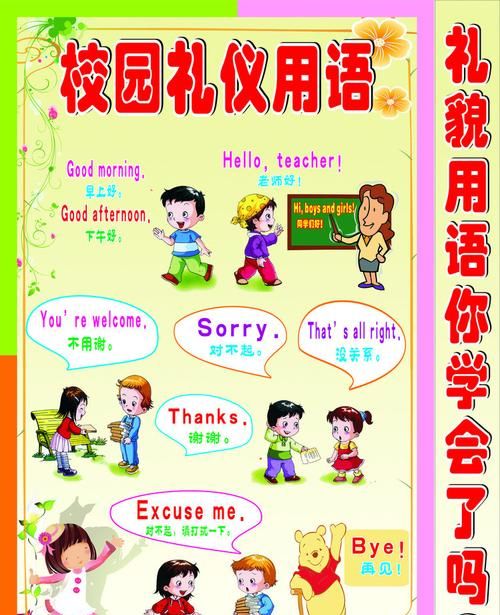本文目录
英语文明礼貌用语对话图文
语言是人类传递信息和表情达意的工具。为了在听话者和说话者之间建立起一座更
顺畅的交流的桥梁,为了建立良好的个人形象,为了避免交流中尴尬或冲突的出现,人们要
使用礼貌用语。英语中一些常见的单词,如:thanks,hello,hi,sorry等,均属于最简单
的礼貌用语。交谈时对方因感冒而打喷嚏,对方会说:"Excuse me",而你会说:"God bles
s you!"。来到商店,售货员会礼貌地问一句:"Can I help you, please?"。这些都是语言
礼貌原则的体现。
人们表达礼貌的方式多种多样,比如:1. I thought you were needing me, Mr.
Singer.(用过去时表示礼貌); 2. May I come in, please?(用情态动词表示礼貌);
3. Every piece of luggage has to be examined through.(用被动式表示礼貌);等等。
本文主要谈的内容是关于英语中选择合适的语言来表达礼貌的问题。
如果谈论一个坐轮椅的人(在汉语中我们说残疾人,而不是残废人),我们最好说a
challenged person,而不是a disabled person。形容老年人最好用senior people, 不要
用old people。也就是说,在英语使用过程中,应该尽量避免暗含性别、种族、身体、年龄
等偏见或歧视的语言。如:
例句一:Ms. Edward is a very large woman and moves around with difficulty but sh
e sparkles with intelligence and wit.。 在当代,如果人们因为种族或宗教原因对别人
表示不敬,就会被看作是“政治上的错误(politically incorrect)”,但是对体态丰满者
的不敬和偏见却并不是这样。上句话中的but一词暗示了说话者的偏见,即:肥胖者通常是笨
拙和愚蠢的。这明显是一种对他人的冒犯,所以这句话可以改为:Ms. Edward, a very lar
ge woman who moves around with difficulty, sparkles with intelligence and wit.。
例句二:Her study looks at some of the special challenges faced by deaf people w
ho are married to normal partners.。使用normal作为与残疾人相对的词来形容健全的人
,实际上暗示身有残疾的人abnormal。我们虽然可以说normal/abnormal hearing, vision
,body movement,etc.,但是normal和abnormal形容人则不甚合适。 这句话可以改为:He
r study looks at some of the special challenges faced by deaf people who are mar
ried to hearing partners.。
例句三:The islanders are a friendly and cheerful people, with a natural gift f
or music and dance that their Western visitors may well envy.。。每一个民族和文化
都倾向于给别的文化定型(如:parsimonious Dutch,hot-blooded Italians,dour Swiss
,conservative Canadians,等等),就算不考虑其中的偏见成分,这种定型没有看到构成
整体的每个个体的特点。friendly and cheerful 实际上走向了种族主义的对立极端---过
分的讨好。natural gift则太强调先天因素,暗含对后天努力的否定,对个体具体表现的忽
视。可以改为:Visitors to the island are made to feel welcome, and are urged to
take in some of the many music and dance performances that are a strong part of
the local culture.。
例句四:The rowdiest of the patrons were hauled off in the paddy wagon, and the
rest soon dispersed.。现在我们肯定不会说“That's awfully white of you”或者“Don
't try to jew me down”之类的暗含种族主义的言论,但是我们很少有人知道paddy在这里
暗含对爱尔兰人的贬义。这类的例子还有:gyp(to swindle or cheat, from gypsy),I
ndian giver(to give only to take back),还有welsh或welch(break a promise or r
efuse to pay a debt)。英国人把梅毒叫作the French pox,而法国人则称之为the Engli
sh pox。这句话可以改为:The rowdiest of the patrons were hauled off in the polic
e van, and the rest soon dispersed.。
还有一类礼貌涉及性别问题,这也是本文将要特别谈到的问题。英语语言趋向于把
男性作为标准:绝大部分词根是男性(阳性),而女性(阴性)则需要加词缀具体说明。对
于力图避免这类歧视的人来说,英语中最具挑战性的部分是人称代词。从传统语法角度来讲
,使用he或him来指代未明性别者是可以的,但是现在越来越多的人把这看作是性别歧视。可
是英语中本来是没有一个代词专指代男性和女性集合中的任何一个的(有人发明了“shim”
,不过似乎没有得到大众的认可),所以为了避免性别歧视,人们只好写作he/she,s/he或
把they用作一个单数代词。he/she或s/he写起来或听起来很不顺,而they作单数又不符合语
法,人们这么写或这么说只是为了显示自己不会使用阳性代词来指代所有的人(包括女性)
。当然在口语中,象"Someone left this fan letter for you, but they didn't sign it
"这样的句子听起来是很自然的,也不会产生歧义,但是在书面语中语法规则要严格得多,所
以they一般只指第三人称复数。如下面一句话就很不合适,并容易产生歧义:
Response to the new version of the program has been favorable; one custome
r, for example, said that they doubled their productivity within the first three
weeks.。
另外,不定代词each,every,anybody等本身是单数,所以按语法规定不能于they结
合,所以下面两句话都是语法错误的:
Each student must hand in their own lab report.
Every guest was given a name tag when they arrived.
同时,我们也可以用he or she(him or her;his or hers),不过要注意一点:尽
量避免在一句话中重复使用he or she,否则就会显得很邋遢。
当谈话涉及到的对象不止是一个人时,用复数人称代词指代就显得更加简洁准确。比
如:
We asked each participant to speak openly about his feelings.
We asked all participants to speak openly about their feelings.(更好)
某些情况下,我们还可以用one来代替he(one有时也可以用来代替第一、二人称)。
使用one时,通常说话者和听话者属于相同的集团,或者有着相同的特点,共同的利益。因此
,从某种意义上说,one传达了“you or I”的意思。比如:As a writer, one could work
it into a book addressing other writers.( Is one making oneself clear?)。再比如
在一篇以phisicians为对象的文章中,与其说:Clinical judgment involves the phisici
an making use of his experience, as well as his knowledge of the particular pati
ent.,不如说:Clinical judgment involves making use of one's experience, as well
as one's knowledge of the particular patient。不过要注意一点:one也不可以过度使
用,否则显得“stuffy”。
在某些可以和读者进行直接交流的文体中,比如在手册、说明书中,我们可以使用yo
u来代替第三人称。如:
The reader should familiarize himself with these terms before proceeding.
Familiarize yourself with these terms before proceeding.(更好)
为了完全避免性别歧视,我们可以使用被动语态。比如与其说:The advantage to m
aking surgeon responsible for acquiring the research data is that he often acqui
res it in any case for clinical purposes.,不如说:The advantage to making surge
on responsible for acquiring the research data is that this information is often
required in any case for clinical purposes.。但是有时使用被动语态会使句子显得笨
拙,或产生歧义,所以被动语态要慎重使用。
最后,我们还可以在主动句中避免使用代词,一般情况下,这也是最简便的方式。比
如:
A psychiatrist may ethically obtain research data from his patients, but h
is main objective must remain that of attending to their needs.
A psychiatrist may ethically obtain research data from patients, but must n
ot lose sight of the main objective of attending to their needs.(更好)
The bashful writer is reluctant to come right out and state his position f
irmly.
The bashful writer is reluctant to come right out and state a firm positio
n.(更好)
有时不用代词很难准确的表情达意,这时应该优先考虑表意的准确性。
英语礼貌用语表达涉及到人们日常生活的方方面面,是一个庞大复杂的系统,本文只
就其中的一两点问题进行了比较肤浅的探讨。为了更加深入的了解英语礼貌用语表达,我们
必须深入的了解整个的英语文化,它的历史,并在具体的语言实践中去认识和掌握它。

礼貌用语英文
礼貌用语英文
礼貌用语英文,文明礼貌是人类进步的一个标志,我们想要成为懂礼貌的人,就需要谨记一些文明礼貌用语,这样也会让他人感到被尊重,下面就为大家分享礼貌用语英文。
礼貌用语英文1
文明礼貌用语:征询语
1、Can (May) I help you? 我能帮您什么吗?
2、May I have your name, please? 请问您的姓名?
3、May I take your order now? 现在为您点菜好吗?
4、May I have your room number? 请问您的房间号码?
5、Could you speak slowly, please? 您能说慢一点吗?
6、Is there anything I can do for you? 有什么能为您效劳的吗?
7、Am I allowed…? 可以允许我…吗?
8、Did you have a nice trip? 旅途愉快吗?
9、Would you like to order now? 您想现在点菜吗?
10、Would you like me to…? 您想要我…吗?
11、Would you mind if…? 您是否介意…吗?
12、What can I do for you? 我能帮您什么吗?
13、What kind of drink do you prefer? / What kind of drink would you like?请问您喜欢喝哪一种饮料?
14、What do you think of our service? 您对我们的服务有什么意见?
15、How do you like our Chinese food/western food? 您喜欢我饭店的中国菜/西餐吗?
16、How do you feel about…? 您觉得…怎么样?
17、Not at all.没关系。
18、Can I help you ?我能帮助你吗?
19、Thank you .谢谢。
20、Thanks ,I can manage it .谢谢,但我自己能行。
21、No thanks.不用,谢谢。
22、Take it easy.别着急。
23、Could you do me a favour?可以帮帮我吗?
24、No problem.没问题。
25、Don’t worry. I will help you.别担心,我会帮你的。
26、It’s my pleasure to help you .我很愿意帮助你。
27、Thank you for your help.谢谢你的帮助。
28、It’s my pleasure.这是我应该做的。
29、Please tell me.麻烦你告诉我一下。
30、May I ask a question?我能问你一个问题吗?
31、Of course.当然可以。
32、Let me think over,please.请让我想一想。
33、Add some trouble to you .给你添麻烦了。
34、This way ,please.请这边走。
35、Keep environment tidy,please.请保持环境卫生。
36、Keep off the grass,please.请不要践踏草坪。
37、Please take care of safety.请注意安全。
38、Be quiet,please.请安静。
39、Wait a minute, please.请稍等一下。
40、Please queue up .请自觉排队。
文明礼貌用语:告别语
1、Good-bye. 再见。
2、See you later. 再见。
3、Good night. 晚安。
4、See you tomorrow. 明天见。
5、Good-bye and thank you for coming. 再见,谢谢您的光临。
6、Good-bye and hope to see you again. 再见,希望再见到您。
7、Have a nice trip! 一路平安!
8、Wish you a pleasant journey! Good luck! 祝您旅途愉快! 祝您好运!
9、We all look forward to serving you again. 我们都希望能再次为您提供服务。
10、Do you really want to go?真的要走了吗?
文明礼貌用语:其他礼貌用语
1、请。Please.
2、打扰了。Excuse me.
3、打扰一下好吗?Would you excuse me?
4、欢迎您到北京来。Welcome to Beijing.
5、您先请。After you.
6、长者先请。Age before beauty.
7、劳驾。Pardon me.
8、请原谅我没听清/弄明白。I beg your pardon.
9、祝贺你。 Congratulations!
10、我想抽支烟,您介意吗?Do you mind if I smoke?
11、您能告诉我去电影院怎么走吗?Could you please tell me the way to the cinema?
文明礼貌用语:面试礼貌用语
一、开场白
1、开门时,一句礼貌的询问会赢得一个良好的第一印象。May I come in?(我可以进来吗?)
2、向老师们问好,面带微笑,朝气蓬勃。
Good morning / afternoon, dear professors. I am XXX. (教授们早上好/下午好,我是XXX)
3、帮帮提醒大家,适当的讨好话也是很有必要的哦!
I am very happy that I am qualified for this interview. It is a privilege to be speaking to you today.(很高兴有机会参加这次面试,今天能跟你们谈话真是我的荣幸)
4、该向老师们作自我介绍了:
Its my great honor / pleasure to introduce myself to you here.(很荣幸/高兴在这儿向大家作自我介绍)
二、对话中
1、没听清或没听懂老师的问题?别担心,礼貌地向老师询问,老师们不会难为你的。
Im sorry I didnt hear that clearly. May I ask you to repeat it, please?(对不起,我没听清楚,可否重复一遍)
I beg your pardon. I dont understand your question.(请原谅,我不太了解你的问题)
Excuse me,I guess I dont make myself clear.(对不起,我想是我自己没有表达清楚)
My I try to say that in another way.(或许我能试着用另一种方式说)
3、得到了老师的夸奖可不要飘飘欲仙哦,也许这是老师对你的考验呢。
Thank you for your compliment. I am far from perfect.(你过奖了,我做得还不够好)
三、结束语
1、面试就是聊天,结束时一定要表达自己聊得很开心。向老师们表达感谢当然也是不可少的礼节。
That is my pleasure. Its been nice talking with you, professors.(这是我的荣幸,和你交谈真愉快,教授)
A thousand thanks for your talking with me.(万分感谢你的面试)
2、对录取的期待也要说出来哦,不能藏着掖着,老师当然想要强烈想当他研究生的学生。
If my application is successful, I assure that I would make every effort to be worthy of the confidence you may place in me. Thank you very much.(如果被录取,一定努力不辜负期望,谢谢)
I ll expect for your notification, professors. (我将期盼您的通知,教授)
Ill look forward to your reply.(我将静候你的回音)
礼貌用语英文2
Hello!
Hi!是"你好!",见面问好常用到。
Goodbye!是"再见!",Good night!道"晚安!"
同学多日不见面,相见问好"How are you?"
答语常用"Im fine. Thank you."
初次认识新朋友,握手问好"Glad to meet you."
打扰别人问问题,开口先说"Excuse me."
别人关心帮助你,感谢用语"Thank you."
致谢用语要牢记,Thats OK."没关系。"
有了过错表歉意,Im sorry."对不起。"
客人来访把门开,Please come in."请进来。"
Sit down, please. "请坐下。"。Please have some tea .
"请喝茶。"
征求意见和请求,"May I... ?"先开头。
同意许可Yes./ Sure. / Certainly. / OK!别忘了。
英文中一些常见的单词,如:thanks,hello,hi,sorry等,均属于最简单的英文礼貌用语。交谈时对方因感冒而打喷嚏,对方会说:"Excuse me",而你会说:"God bless you!"来到商店,售货员会礼貌地问一句:"Can I help you, please?"。这些都是语言礼貌原则的.体现。人们表达礼貌的'方式多种多样。
1、正式
Send [someone] my best.
给[某人]我最好的祝福。
Send [someone] my best regards.
向[某人]献上我最诚挚的问候。
Send [someone] my greetings.
向[某人]问好。
Give [someone] my best wishes.
给予[某人]我最好的祝福。
Pass on my greetings to [someone].
向[某人]转达我的问候。
My best to [someone].
最好的祝愿给[某人]。
All the best to [someone].
祝[某人]一切顺利。
Send [someone] my compliments.
向[某人]表达我的赞美。
2、不太正式
Tell [someone] I say hello.
告诉[某人]我过打招呼。
Say hi to [someone] from me.
向[某人]传达来自我的问候。
3、亲密的表达
Send [someone] my love.
向[某人]表达我的爱。
*tell [someone] I send kisses
告诉[某人]我向他献吻
*give her a kiss from me
给她一个我的吻
这里要注意,除非你谈论的是家人,否则在英语文化中(尤其是英国)很少使用“kiss”,因为使用“kisses”来问候别人的做法并没有被广泛使用。
在许多拉丁国家,“kiss”的意思是“问候”或“打招呼”,但在英语文化中,“kiss”更亲密,只有当说话的人和传递问候的人都可以亲吻第三方才会使用(当然,这是不太可能的)。
常用的礼貌英语口语客套话
Sorry to bother you.
翻译为“不好意思打扰一下”,是非常客气的一种说话方式。
比如排队时,想问工作人员这个队伍大概要等多久,可以说:
Sorry to bother you, how long is the wait ?
不好意思打扰下,请问要等多久?
*bother 打扰,烦扰
Have a good one!
翻译为“祝你有美好的一天!“
和Have a good day!表达相同的意思,这里one替换了day。
After you.
翻译为“你先走/你先请”。
想表示自己很绅士,遇到了老人家、孕妇等,想让他们先走,比如先上/下电梯,怎么说呢?
很多小伙伴第一反应可能就是“You go first”这样的直译,但其实更加有礼貌、更加地道的英语表达方式,可以说:
After you.
我在你后面,你先走吧。
礼貌用语英文3
一、thanks
英[θks] 美[θks]
n. 感谢,谢谢; 感谢,谢谢,道谢的话( thank的名词复数 );
int. 感激(的),致谢(的);
v. 谢谢,感谢( thank的第三人称单数 ); 责怪;
Thanks for your advice and encouragement.
谢谢你的建议和鼓励。
原型: thank
二、hello
英[hl] 美[hlo]
int. 打招呼; 哈喽,喂; 你好,您好; 表示问候;
n. “喂”的招呼声或问候声;
vi. 喊“喂”;
Hello, Trish
你好,特里茜。
复数:hellos
三、sorry
英[sri] 美[sɑ:ri]
adj. 遗憾的; 对不起的; 无价值的,低等的; 感到伤心的;
Were all talking at the same time. — Yeah. Sorry.
我们俩在同时讲话。——“噢,抱歉。”
比较级:sorrier
最高级:sorriest
四、welcome
英[welkm] 美[wlkm]
vt. 欢迎; 乐于接受;
adj. 受欢迎的; 令人愉悦的; 表示感谢的;
n. 欢迎,迎接;
Several people came by to welcome me
有几个人过来迎接我。
比较级:welcomer
最高级:welcomest
五、please
英[pli:z] 美[pliz]
int. 请;
vt. 讨好; 使高兴; 使满意; 讨人喜欢;
Can you help us please?
能请你帮帮我们吗?
第三人称单数:pleases
现在分词:pleasing
过去式:pleased
过去分词:pleased

礼貌用语英文
英文礼貌用语如下:
1、Can I help you?
我能帮您什么吗?
2、May I have your name,please?
请问您的姓名?
3、Is there anything I can do for you?
有什么能为您效劳的吗?
4、Would you mind if......?
您是否介意......吗?

5、Not at all.
没关系。
6、Thanks,I can manage it.
谢谢,但我自己能行。
7、Could you do me a favour?
可以帮帮我吗?
8、It's my pleasure to help you.
我很愿意帮助你。

9、Thank you for your help.
谢谢你的帮助。
10、May I ask a question?
我能问你一个问题吗?
11、Add some trouble to you.
给你添麻烦了。
12、Good-bye and hope to see you again.
再见,希望再见到您。
礼貌用语英文怎么说
礼貌用语: polite expression
如:"闭嘴"(意为"别说话")不是礼貌用语.
Shut up(meaning "Stop talking")is not a polite expression.

以上就是关于礼貌用语英文版,英语文明礼貌用语对话图文的全部内容,以及礼貌用语英文版 的相关内容,希望能够帮到您。

